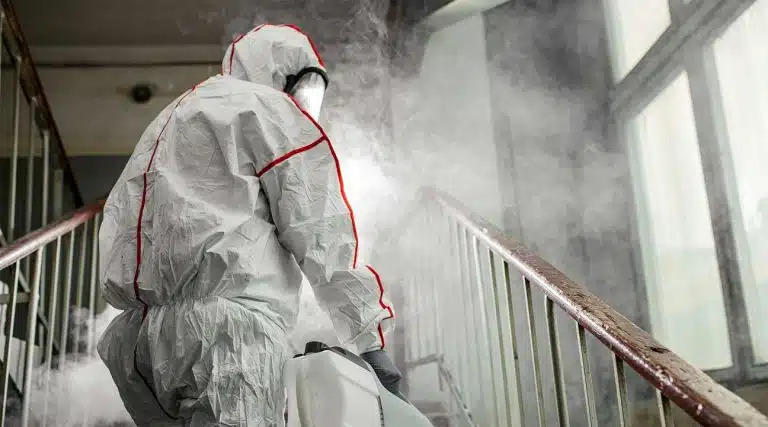How To Clean Meth Residue | Health Risks & Other Concerns

Methamphetamine, or meth, is a highly addictive stimulant drug. Some people use it illegally to feel euphoric or “high.”
People cook meth in houses, apartments, sheds, and other buildings. Called methamphetamine laboratories (or “meth labs” or “meth houses”), these structures pose serious health risks due to meth residue.
Health Risks Of Meth Residue
In a methamphetamine lab, residue can appear when someone smokes or cooks the drug.
Residue From Smoking Meth
When someone smokes meth, they inhale about 67% of it, with 33% lingering in the environment. The lingering smoke may be absorbed by walls, carpets, countertops, and various other objects.
Someone who inhales or ingests meth smoke residue may experience side effects of meth. These physical and mental health effects can include:
- hyperactivity
- loss of appetite
- mood swings
- paranoia
- delusions (beliefs that aren’t based in reality)
- hallucinations (seeing, hearing, or feeling things that aren’t there)
- confusion
- aggression
- twitching or shaking
- faster breathing
- irregular heartbeat
- increased body temperature, which may cause fainting
Residue From Cooking Meth
As meth cooks, it releases vapors that, like meth smoke, can be absorbed by various items. These vapors may include toxic meth ingredients such as ether, lithium, ammonia, acetone, and pseudoephedrine.
In addition, during the cooking process, someone may spill the ingredients, further contaminating floors and other items.
When inhaled, touched, or ingested, residue from meth production can cause health problems like:
- headache
- nausea
- vomiting
- rash
- eye, nose, and throat irritation
- dizziness
- confusion
- trouble breathing
- chemical burns
How To Clean A Meth House
If you suspect your home or property is a former meth lab, contact law enforcement to perform a test.
If the test results are positive, evacuate the property and plan for remediation.
The Environmental Protection Agency (EPA) says homeowners and other property owners should hire a contractor trained in meth lab waste removal to help with the decontamination and cleaning process.
The process should involve:
Surveying
Examine every aspect of the building so you can design a cleanup plan with your contractor. Your plan should include information like:
- contamination levels in each room
- items that need cleaning
- items that need removal
- items that need encapsulation (sealing to prevent the spread of toxic particles)
- plans for removing hazardous waste (including wastewater) that follow your local health department’s rules
Before entering the building, put on personal protective equipment (PPE) like gloves, protective glasses, steel toe boots, long sleeve shirts, long pants, and a respirator.
These items help protect you from not only meth residue but also other hazardous materials that might be revealed during remediation, such as asbestos, lead, and mercury.
Ventilation
A few days before you begin cleaning, ventilate the property by opening doors and windows and setting up fans, blowers, and a negative air unit with a High Efficiency Particulate Air (HEPA) filtration system.
Also, turn off your heating and air conditioning systems. Otherwise, the ductwork and filters may redistribute contaminants throughout the building.
Continue these strategies throughout the cleaning process and for a couple days after it’s complete.
Plumbing
Often, people who work in drug labs throw hazardous waste down toilets, sinks, and drains. The waste can get trapped in drains and septic systems, producing a toxic odor.
Call a plumber to remove toxic waste from your plumbing system. You may need to replace certain features.
Also, if you notice suspicious smells or stains in your yard or septic system, contact your local department of health.
Item Removal & Replacement
Remove or replace all:
- unnecessary items
- stained, odorous, or damaged items
- carpeting, drapes, clothing, and other absorbent items, which most likely contain contaminants
Contact your local health department to determine which items should go to a landfill and which items should go to a facility that specializes in hazardous waste.
Don’t touch suspicious items such as drug paraphernalia or containers with unknown substances. Instead, contact law enforcement officials to safely examine them.
Washing
Thoroughly wash all remaining items and surfaces, including your HVAC system. In most cases, an all-purpose household cleaner will work. Avoid harsh chemicals such as bleach.
Vacuuming
After removing all carpeting and pads, clean all floors and hard surfaces with a vacuum that features a HEPA filter. This filter can capture extremely tiny particles that normal filters can’t.
Encapsulating
Encapsulate all interior surfaces (such as floors, walls, and ceilings) using a strong primer followed by an oil-based paint, oil-based polyurethane, or epoxies.
Add a finishing coat for extra protection.
Even short-term meth use can lead to addiction. If you or someone you love struggles with this illegal drug, please contact an Ark Behavioral Health specialist to learn about our substance abuse and addiction treatment programs.
Written by Ark Behavioral Health Editorial Team
©2024 Ark National Holdings, LLC. | All Rights Reserved.
This page does not provide medical advice.
Missouri Department of Natural Resources - Guidelines for Cleaning Up Former Methamphetamine Labs
National Institute on Drug Abuse - What are the long-term effects of methamphetamine misuse?
National Library of Medicine - Health effects from reported exposure to methamphetamine labs: a poison center-based study
National Library of Medicine - Household Contamination with Methamphetamine: Knowledge and Uncertainties
United States Environmental Protection Agency - Voluntary Guidelines for Methamphetamine Laboratory Cleanup

Questions About Treatment?
Ark Behavioral Health offers 100% confidential substance abuse assessment and treatment placement tailored to your individual needs. Achieve long-term recovery.
100% confidential. We respect your privacy.
Prefer Texting?
Our friendly support team is here to chat 24/7. Opt out any time.







 Learn More
Learn More








